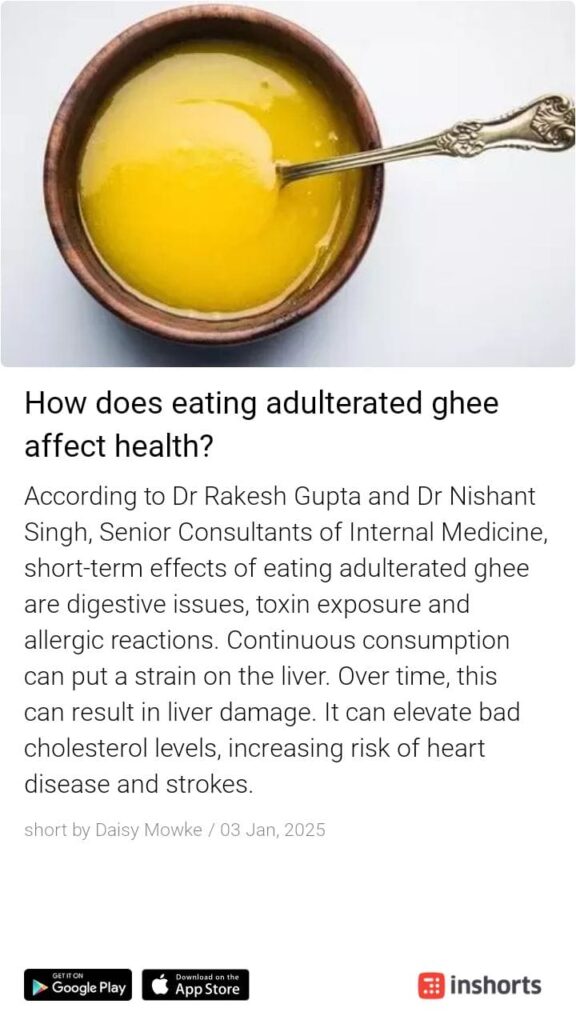Ghee, often referred to as clarified butter, has been cherished in Indian kitchens for centuries. Known for its rich flavor, aroma, and numerous health benefits, it occupies a prominent place in traditional cooking, ayurvedic medicine, and religious practices. However, the increasing prevalence of adulterated ghee in the market has raised serious health concerns. Experts caution that consumption of adulterated ghee, while seemingly harmless in small quantities, can have short-term and long-term consequences for health.
Immediate Health Risks of Adulterated Ghee
According to Dr. Rakesh Gupta and Dr. Nishant Singh, Senior Consultants of Internal Medicine, consuming ghee that contains impurities or harmful additives can lead to several immediate health issues. In the short term, adulterated ghee can trigger digestive problems, such as bloating, nausea, and indigestion. This is primarily due to the presence of harmful substances that disrupt the normal digestive process.
Additionally, adulterated ghee can cause toxic exposure and allergic reactions, especially in individuals sensitive to synthetic chemicals or artificial additives used in the adulteration process. These reactions may manifest as skin rashes, breathing difficulties, or inflammation.
Long-Term Consequences of Continuous Consumption
While occasional consumption of adulterated ghee may cause temporary discomfort, regular intake can result in more serious health complications over time. Continuous exposure to harmful chemicals and toxins puts an enormous strain on the liver, which plays a vital role in detoxifying the body. Over time, this can lead to liver damage or fatty liver disease, both of which are difficult to treat and can severely affect overall health.
Moreover, adulterated ghee can significantly increase levels of low-density lipoprotein (LDL), commonly known as “bad cholesterol.” Elevated LDL levels can cause plaque buildup in the arteries, raising the risk of atherosclerosis, heart disease, and strokes. Since cardiovascular issues are already a leading cause of mortality worldwide, consuming impure ghee further compounds the problem.
Understanding Adulteration in Ghee
Ghee adulteration often involves the use of harmful substances such as vanaspati (hydrogenated fats), synthetic colors, and cheap oils. These additives not only dilute the nutritional value of ghee but also introduce trans fats and synthetic compounds that are hazardous to health. Consuming these adulterated fats disrupts the body’s lipid metabolism, leading to increased cholesterol levels and inflammation in vital organs.
How to Identify Pure Ghee
Given the widespread adulteration in the market, it’s essential for consumers to be vigilant when purchasing ghee. Here are some tips to identify pure ghee:
- Aroma and Taste: Pure ghee has a distinct nutty aroma and a rich, pleasant taste. Adulterated ghee may have a synthetic or off-putting smell.
- Melting Test: Pure ghee melts at body temperature, while adulterated varieties may remain solid or show uneven melting.
- Iodine Test: A simple iodine test at home can reveal the presence of starch, often added to increase the volume of adulterated ghee.
- Source: Buy ghee from trusted brands or local producers who follow ethical production practices.
Preventive Measures and Consumer Awareness
Government bodies and food regulatory authorities must take stringent measures to curb food adulteration. Regular quality checks, strict enforcement of food safety standards, and awareness campaigns can play a crucial role in protecting public health. Consumers, on their part, should be aware of the risks and practice caution by purchasing only certified, high-quality ghee.
Conclusion
Ghee, when pure, can be a powerhouse of nutrition, offering healthy fats and essential vitamins. However, adulterated ghee not only robs it of its nutritional value but also introduces harmful substances that can wreak havoc on health. To safeguard against its harmful effects, consumers must make informed choices, prioritize quality over cost, and remain vigilant about the products they bring into their homes. Ensuring the purity of ghee isn’t just about taste—it’s a vital step toward maintaining long-term health and well-being.

HealthRisks #AdulteratedGhee #FoodSafety #PureGhee #HealthyEating #GheeBenefits #DigestiveHealth #LiverCare #HeartHealth #CholesterolAwareness #EatPure #StayHealthy #NutritionMatters #FoodAdulteration #HealthyLifestyle #ConsumerAwareness #SayNoToAdulteration #CleanEating #TraditionalFood #BetterHealth
